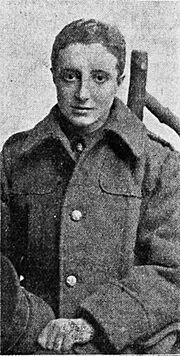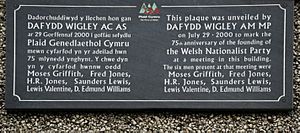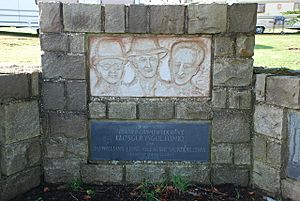Saunders Lewis facts for kids
Quick facts for kids
Saunders Lewis
|
|
|---|---|

Saunders Lewis as an army officer in 1916
|
|
| President of Plaid Cymru | |
| In office 1926–1939 |
|
| Preceded by | Lewis Valentine |
| Succeeded by | John Edward Daniel |
| Personal details | |
| Born |
John Saunders Lewis
15 October 1893 Wallasey, Cheshire, England |
| Died | 1 September 1985 (aged 91) Cardiff, Wales |
| Political party | Plaid Cymru |
| Spouse |
Margaret Gilcriest
(m. 1924; died 1984) |
| Children | 1 |
| Alma mater | University of Liverpool |
Saunders Lewis (born John Saunders Lewis; 15 October 1893 – 1 September 1985) was a Welsh politician, poet, and writer. He was a strong Welsh nationalist who supported Welsh independence. He also helped start Plaid Genedlaethol Cymru (The National Party of Wales), which is now known as Plaid Cymru.
Lewis is often seen as one of the most important figures in 20th-century Welsh literature. In 1970, he was even nominated for a Nobel Prize in Literature. In 2004, he was voted the tenth greatest Welsh hero in a special poll.
Contents
- Early Life and Education
- Serving in World War I
- Returning to Wales and Teaching
- Founding Plaid Cymru
- Lewis's Vision for Wales
- Broadcasting and the Welsh Language
- The Penyberth Fire of 1936
- World War II and Politics
- 1943 University Election
- Tynged yr Iaith and the Welsh Language
- Literary Achievements
- Later Life and Legacy
- Electoral Record
Early Life and Education
John Saunders Lewis was born on 15 October 1893, in Wallasey, England. His family spoke Welsh, even though they lived in England. He was the second of three sons.
When Lewis was only six years old, his mother died. His aunt, Ellen Elizabeth Thomas, then moved in to help raise him.
Lewis later remembered that there were many Welsh-speaking people around Liverpool where he grew up. He said he was born into a "completely Welsh and Welsh-speaking" community.
He went to Liscard High School for Boys, an English-speaking school. At first, he was bullied because his English had many Welsh words. But over time, he became very good at English.
He later studied English and French at Liverpool University.
Serving in World War I
When World War I started in 1914, Lewis joined the army as a volunteer. He became a full lieutenant in 1916. He served in France and was wounded in a battle.
During the war, Lewis read books by a French writer named Maurice Barrès. Barrès was a French nationalist, and his ideas greatly influenced Lewis's own Welsh nationalism. Lewis realized how important his Welsh roots were while serving in France.
Returning to Wales and Teaching
After the war, Lewis started working in literature. He believed Welsh literature needed to be more professional, connect with European culture, and explore old Welsh history.
In 1922, he became a lecturer in Welsh literature at the University of Wales, Swansea. While there, he wrote important books about literary criticism. He stayed in this job until 1936, when he was dismissed for a political act.
Founding Plaid Cymru
For a long time, people in Wales had talked about needing their own political party. By the 1920s, many wanted Welsh politics to focus on their nation. Lewis's experiences in World War I and his support for Irish independence led him to Welsh nationalism. He strongly believed in Welsh independence.
In 1924, Lewis started a group called Y Mudiad Cymreig ("The Welsh Movement"). They met secretly to plan how to "rescue Wales from political and cultural oblivion."
Around the same time, another nationalist group formed in Caernarfon. Its leader, Huw Robert Jones, contacted Lewis. They decided to create a new political party together.
Lewis and other leaders met in Pwllheli in 1925. They founded Plaid Genedlaethol Cymru ("National Party of Wales") on 5 August 1925. The party's main goal was to make Wales a Welsh-speaking country. They agreed that all party business should be in Welsh. Members also had to cut ties with other British political parties. Lewis insisted on these rules.
In 1911, about 43.5% of people in Wales spoke Welsh. This was a decrease from earlier years. Lewis believed that the party's strict rules were important to show that Wales was unique. Even just by existing, the party declared that Wales was a distinct nation.
Lewis's Vision for Wales
Between the two World Wars, Plaid Cymru worked more as a social and educational group. Saunders Lewis was the party president from 1926 to 1939. He said the party's main goal was to help Welsh people feel proud and remove the "shame of conquest."
Lewis wanted to show how Welsh heritage was connected to the founding of European civilization. He believed that Wales had a special place in this history. He also worked for strong, educated, and successful local communities in Welsh-speaking areas. He supported an idea called perchentyaeth, which meant sharing property among many people. This idea was based on traditional Christian beliefs.
Broadcasting and the Welsh Language
Saunders Lewis worried that early BBC radio in Wales, which was mostly in English, would harm the Welsh language. At the time, only about 36% of people in Wales spoke Welsh. He wanted the BBC to help the Welsh language, not hurt it.
He pushed for more Welsh-language broadcasts. He even said that people might refuse to pay for English programs. Over time, Lewis's efforts helped Plaid Cymru gain influence within the BBC in Wales.
The Penyberth Fire of 1936
Welsh nationalism grew stronger in 1936 because of a protest known as Tân yn Llŷn ("Fire in Llŷn"). The UK Government decided to build an RAF training camp at Penyberth in Gwynedd. This area was important for Welsh culture and language.
Many Welsh people protested, but the Prime Minister refused to listen. Lewis wrote that the government wanted to turn a "home of Welsh culture" into a place for war training. This military academy started being built exactly 400 years after Wales was officially joined with England.
On 8 September 1936, the building was set on fire. Saunders Lewis, Lewis Valentine, and D. J. Williams said they were responsible. They were tried in Caernarfon, but the jury couldn't agree. The trial was moved to London, where the "Three" were found guilty and sentenced to nine months in prison.
When they were released, 15,000 Welsh people greeted them as heroes. Many Welsh people were angry that the judge made fun of the Welsh language and that the trial was moved to London. Lewis was also fired from his university job before he was found guilty. This event was a big moment for Welsh people, showing they could fight back.
However, Lewis's idea of perchentyaeth was later rejected by the party. In 1939, Lewis resigned as president of Plaid Cymru. He felt Wales was not ready to accept a Roman Catholic leader. Lewis had converted to Roman Catholicism in 1932.
World War II and Politics
During World War II, Lewis wrote columns that tried to be neutral about the war's causes and events. Plaid Cymru officially stayed neutral about the war. Lewis and other leaders saw it as a continuation of the First World War.
They believed Wales, as a nation, should decide its own stance on war. They also rejected other nations forcing Welshmen to serve in their armies. Lewis hoped many Welshmen would refuse to join the British Army. He wanted to strengthen loyalty to Wales over loyalty to the British State.
Most party members who refused military service did so for moral or religious reasons. About 24 members refused only for political reasons, and 12 of them went to prison. For Lewis, these people showed that Wales was resisting being fully absorbed into England.
1943 University Election
Before 1950, universities could elect their own representatives to the UK Parliament. In 1943, Lewis ran for the University of Wales seat for Plaid Cymru.
His opponent was William John Gruffydd, a former member of Plaid Cymru who had joined the Liberal Party. Another opponent was Alun Talfan Davies, also a former Plaid Cymru member.
Gruffydd won the election with 52.3% of the vote, while Lewis got 22.5%. This election divided Welsh-speaking intellectuals. Lewis became less involved in direct politics after this. However, the election was important for Plaid Cymru because it showed they were a serious political force. It also led to a big increase in the party's members.
Tynged yr Iaith and the Welsh Language
In 1962, Lewis gave a famous radio speech called Tynged yr iaith ("The Fate of the Language"). He warned that the Welsh language could completely die out by 2000 if no action was taken.
This speech was a response to the 1961 census. It showed that the percentage of Welsh speakers had dropped from 36% in 1931 to 26%. Lewis said the Welsh language was "driven into a corner." He blamed both the British government and the Welsh people's own lack of action.
Lewis's speech was meant to push Plaid Cymru to do more for the Welsh language. Instead, it led to the creation of Cymdeithas yr Iaith Gymraeg (Welsh Language Society) later that year. This society focused on peaceful protests against policies that harmed the Welsh language.
Because of these efforts, the British government started to recognize Welsh culture more. In 1964, the Welsh Office was created. In 1967, the Welsh Language Bill gave Welsh equal status to English in the legal system. More laws also helped create Welsh-medium education.
Literary Achievements
Lewis was mainly a playwright. His famous plays include Blodeuwedd (The woman of flowers), Buchedd Garmon (The life of Germanus), and Siwan. He also translated a French play into Welsh. His plays covered many topics, including Welsh myths, history, and the Christian Bible.
He used different poetic styles in Welsh, including traditional forms and free verse. After he became Catholic, he also wrote many Christian poems.
Lewis wrote the words for an opera called Serch yw'r doctor (Love's the doctor). He also published two novels, Monica and Merch Gwern Hywel. He wrote many articles and essays for newspapers and magazines.
In 1970, Lewis was nominated for the Nobel Prize in Literature. By the time he died in 1985, he was considered one of the most celebrated Welsh writers.
Later Life and Legacy
In 1983, at 89 years old, Saunders Lewis received an honorary doctorate from the University of Wales. He had also asked for Mass to be said in Latin in Wales, rather than in English.
Lewis's ideas are still discussed today. Some of his views, like his interest in medieval studies and the Catholic Church, were different from other Welsh nationalists. He believed that language revival and Christian democracy were more important for Welsh nationalism than socialism.
Some critics said Lewis had "elitist" views because he praised medieval Welsh bards who wrote about a stable, old civilization. Others criticized his views on Welsh Nonconformist traditions.
However, Lewis's strong personality and ideas were very important for Plaid Cymru in the 1930s. His 1961 radio speech is often credited with helping to save the Welsh language. Because of his efforts, Welsh is the only Celtic language that is not dead or critically endangered.
Today, even in traditionally English-speaking Welsh towns, Welsh-medium education is growing. This helps to revive both the language and culture. For these reasons, Saunders Lewis was voted the 10th greatest Welsh hero in 2004.
Electoral Record
Lewis ran for the University of Wales seat in Parliament twice:
- In the general election of 1931, he received 24.6% of the vote.
- In the by-election of 1943, he received 22.5% of the vote.
 | Delilah Pierce |
 | Gordon Parks |
 | Augusta Savage |
 | Charles Ethan Porter |



